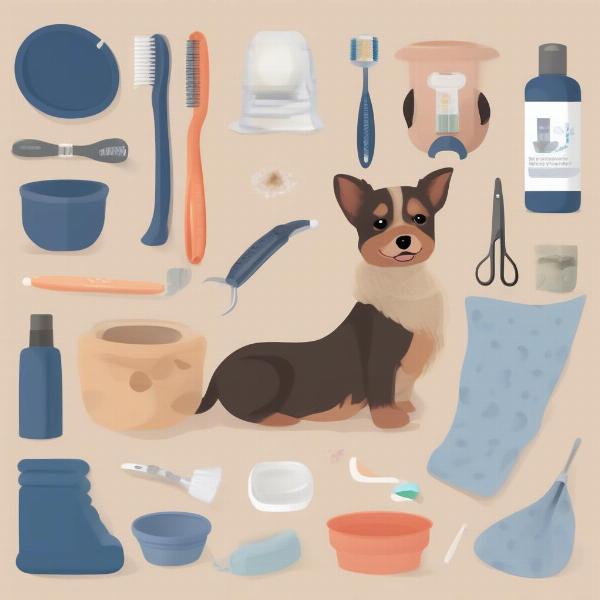“Lil dog” is a common term used to describe small breeds, and it encompasses a world of adorable companions. But owning a “lil dog” is more than just cute cuddles and tiny paws. It requires understanding their unique needs and responsibilities that come with caring for these smaller canine companions. From choosing the right breed to providing proper nutrition and training, this comprehensive guide covers everything you need to know about “lil dog” ownership.
Choosing the Right Lil Dog Breed for You
With so many adorable small breeds, finding the perfect “lil dog” can be overwhelming. Consider your lifestyle, living space, and experience with dogs. A high-energy breed like a Jack Russell Terrier might not be suitable for apartment living, while a more laid-back Shih Tzu could be a perfect fit. Researching breeds thoroughly is key to finding your ideal companion. Do you prefer a fluffy “lil dog” or one with a shorter coat? Are you prepared for the grooming needs of a Maltese or would a low-maintenance breed like a Beagle be a better match?
Health and Care for Your Lil Dog
Smaller dogs are prone to certain health issues, such as dental problems and fragile bones. Regular vet checkups and a balanced diet are essential for maintaining their health. Are you prepared for potential vet bills? Investing in pet insurance can help alleviate financial burdens. Understanding the specific health concerns related to your chosen breed can help you provide proactive care. For instance, brachycephalic breeds like Pugs and French Bulldogs are susceptible to respiratory issues.
 Health and Care for Small Dogs
Health and Care for Small Dogs
Training and Socializing Your Lil Dog
dog-door-for-sliding-patio-door
Despite their size, “lil dogs” still require proper training and socialization. Early socialization is crucial for preventing behavioral issues and ensuring they get along with other animals and people. Start with basic obedience training and gradually introduce them to new environments and experiences. Just like larger breeds, “lil dogs” need mental stimulation and physical exercise. Consider puzzle toys and short, frequent walks to keep them entertained and healthy.
Understanding Common Lil Dog Behaviors
Small dogs sometimes exhibit behaviors like excessive barking or separation anxiety. These behaviors can often stem from insecurity or lack of proper training. Addressing these issues early on with positive reinforcement methods can prevent them from becoming ingrained habits.
“Training a “lil dog” requires patience and consistency, but the rewards are immense. A well-trained small dog is a joy to be around,” says Dr. Emily Carter, a certified veterinary behaviorist.
Nutrition for Lil Dogs: Small Size, Big Needs
“Lil dogs” have faster metabolisms and require a diet specifically formulated for their nutritional needs. Choose high-quality food with appropriate portion sizes to prevent obesity, which can exacerbate health issues. Feeding your “lil dog” several smaller meals throughout the day can be more beneficial than two large meals.
Grooming Your Lil Dog: Keeping Them Looking Their Best
Grooming needs vary depending on the breed. Regular brushing, bathing, and nail trims are essential for maintaining a healthy coat and preventing matting. Some “lil dogs” require professional grooming, while others can be easily maintained at home.
“Regular grooming is not just about aesthetics. It’s an essential part of keeping your “lil dog” healthy and comfortable,” advises Sarah Miller, a professional dog groomer.
Conclusion: Embracing the Joys of Lil Dog Ownership
Owning a “lil dog” brings immense joy and companionship. By understanding their specific needs and providing proper care, training, and nutrition, you can ensure a long, happy, and healthy life for your small but mighty canine friend.
FAQ
- Are “lil dogs” good for apartment living? Many small breeds are well-suited to apartment living, but consider their energy levels and exercise needs.
- Do “lil dogs” need as much training as larger dogs? Absolutely! Training is essential for all dogs, regardless of size.
- What are some common health problems in “lil dogs”? Dental issues, fragile bones, and certain breed-specific conditions are common in smaller breeds.
- What should I feed my “lil dog”? Choose high-quality dog food formulated for small breeds and feed appropriate portion sizes.
- How often should I groom my “lil dog”? Grooming frequency depends on the breed and coat type. Consult a groomer or veterinarian for guidance.
- Are “lil dogs” good with children? Some small breeds are great with children, while others may be more sensitive. Research breeds carefully before introducing them to kids.
- What are the benefits of owning a “lil dog”? They are often portable, require less space, and can be wonderful companions.
ILM Dog is a leading international online resource for dog owners, offering expert advice on dog breeds, health, training, nutrition, grooming, and more. We are dedicated to providing practical and trustworthy information to help you provide the best possible care for your canine companion. From puppyhood to senior years, we cover all aspects of dog ownership. For personalized guidance and to explore our extensive resources, contact us via email at [email protected] or call us at +44 20-3965-8624. ILM Dog is your trusted partner in all things canine.